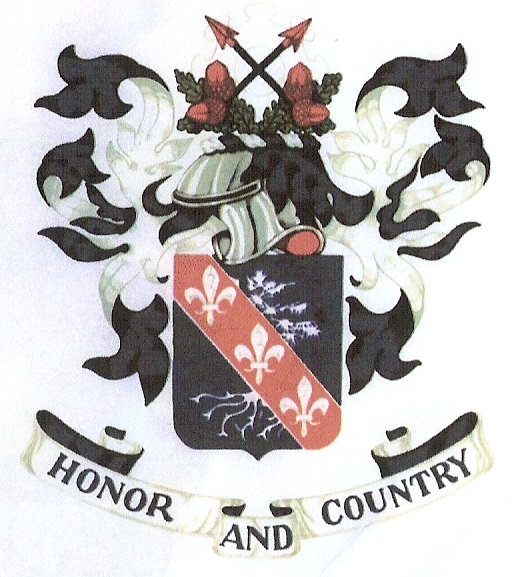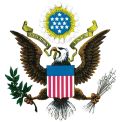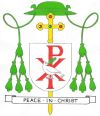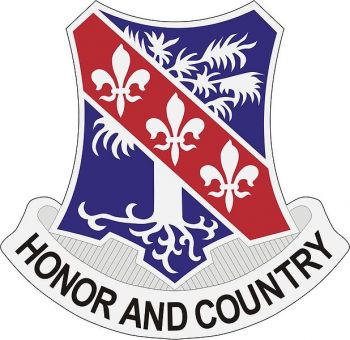327th Infantry Regiment, US Army: Difference between revisions
No edit summary |
Knorrepoes (talk | contribs) m (Text replacement - " Lorraine" to " Lorraine") |
||
| Line 22: | Line 22: | ||
===Origin/meaning=== | ===Origin/meaning=== | ||
Shield: The shield is blue for Infantry; blue is also the color of the South Carolina State flag. The palmetto tree is from the State flag of South Carolina, the allocation of the 327th Infantry. The red bend is taken from the arms of the ancient province of Lorraine, and the fleurs-de-lis indicate the three major operations in which the organization participated during World War I. Crest: The nebuly delineation, a heraldic simulation for clouds, represents the descent of the 327th Infantry from the 327th Glider Infantry, an organic element of the 101st Airborne Division during World War II. The two spearheads surmounting the nebuly pierced disc indicate the combat glider landings and aggressive action of the unit in Normandy and the Rhineland. The oak leaves and acorn connote Bastogne in the Ardennes. The pierced white disc further alludes to the snow and encircled Bastogne during the Battle of the Bulge for which the organization was awarded the Distinguished Unit Citation. Additionally, the colors red and green refer to the foreign decorations French Croix de Guerre with Palm, World War II, and the Belgian Croix de Guerre, 1940. | Shield: The shield is blue for Infantry; blue is also the color of the South Carolina State flag. The palmetto tree is from the State flag of South Carolina, the allocation of the 327th Infantry. The red bend is taken from the arms of the ancient province of [[Lorraine]], and the fleurs-de-lis indicate the three major operations in which the organization participated during World War I. Crest: The nebuly delineation, a heraldic simulation for clouds, represents the descent of the 327th Infantry from the 327th Glider Infantry, an organic element of the 101st Airborne Division during World War II. The two spearheads surmounting the nebuly pierced disc indicate the combat glider landings and aggressive action of the unit in Normandy and the Rhineland. The oak leaves and acorn connote Bastogne in the Ardennes. The pierced white disc further alludes to the snow and encircled Bastogne during the Battle of the Bulge for which the organization was awarded the Distinguished Unit Citation. Additionally, the colors red and green refer to the foreign decorations French Croix de Guerre with Palm, World War II, and the Belgian Croix de Guerre, 1940. | ||
The Coat of Arms was originally approved for the 327th Infantry Regiment, Organized Reserves on 6 September 1928. It was redesignated for the 327th Glider Infantry Regiment, Organized Reserves on 8 October 1942. It was redesignated for the 516th Airborne Infantry Regiment and amended to delete the Organized Reserves crest on 25 September 1951. The insignia was redesignated for the 327th Airborne Infantry Regiment on 31 July 1956. The insignia was redesignated for the 327th Infantry Regiment on 13 February 1958. The coat of arms was amended to add a crest on 9 April 1968. The Distinctive Unit Insignia was originally approved for the 327th Infantry Regiment, Organized Reserves on 6 September 1928. It was redesignated for the 327th Glider Infantry Regiment, Organized Reserves on 9 October 1942. It was redesignated for the 516th Airborne Infantry Regiment on 25 September 1951. The insignia was redesignated for the 327th Airborne Infantry Regiment on 31 July 1956. The insignia was redesignated for the 327th Infantry Regiment on 13 February 1958. | The Coat of Arms was originally approved for the 327th Infantry Regiment, Organized Reserves on 6 September 1928. It was redesignated for the 327th Glider Infantry Regiment, Organized Reserves on 8 October 1942. It was redesignated for the 516th Airborne Infantry Regiment and amended to delete the Organized Reserves crest on 25 September 1951. The insignia was redesignated for the 327th Airborne Infantry Regiment on 31 July 1956. The insignia was redesignated for the 327th Infantry Regiment on 13 February 1958. The coat of arms was amended to add a crest on 9 April 1968. The Distinctive Unit Insignia was originally approved for the 327th Infantry Regiment, Organized Reserves on 6 September 1928. It was redesignated for the 327th Glider Infantry Regiment, Organized Reserves on 9 October 1942. It was redesignated for the 516th Airborne Infantry Regiment on 25 September 1951. The insignia was redesignated for the 327th Airborne Infantry Regiment on 31 July 1956. The insignia was redesignated for the 327th Infantry Regiment on 13 February 1958. | ||
Revision as of 05:59, 12 March 2021
US heraldry portal
This page is part of the US heraldry portal |
Heraldry of the World |
|
US heraldry:
|
Ecclesiastical Heraldry of the USA:
Military Heraldry: |
327TH INFANTRY REGIMENT, US ARMY
 (Coat of Arms)
|
(Distinctive Unit Insignia)
|
Official blazon
Shield: Azure, a palmetto tree eradicated Argent, overall a bend Gules fimbriated of the second charged with three fleurs-de-lis palewise of the like.
Crest: On a wreath Argent and Azure, in front of a plate nebuly and pierced, two spears saltirewise staffs Sable spearheads Gules, in base overall two sprigs of oak conjoined Vert fructed of the fourth.
Motto: HONOR AND COUNTRY.
Distinctive Unit Insignia. Description: A Silver color metal and enamel device 1 1/8 inches (2.86 cm) in height consisting of a shield blazoned: Azure, a palmetto tree eradicated Argent, overall a bend Gules fimbriated of the second charged with three fleurs-de-lis palewise of the like. Attached below the shield is a Silver scroll inscribed "HONOR AND COUNTRY" in Black letters.
Origin/meaning
Shield: The shield is blue for Infantry; blue is also the color of the South Carolina State flag. The palmetto tree is from the State flag of South Carolina, the allocation of the 327th Infantry. The red bend is taken from the arms of the ancient province of Lorraine, and the fleurs-de-lis indicate the three major operations in which the organization participated during World War I. Crest: The nebuly delineation, a heraldic simulation for clouds, represents the descent of the 327th Infantry from the 327th Glider Infantry, an organic element of the 101st Airborne Division during World War II. The two spearheads surmounting the nebuly pierced disc indicate the combat glider landings and aggressive action of the unit in Normandy and the Rhineland. The oak leaves and acorn connote Bastogne in the Ardennes. The pierced white disc further alludes to the snow and encircled Bastogne during the Battle of the Bulge for which the organization was awarded the Distinguished Unit Citation. Additionally, the colors red and green refer to the foreign decorations French Croix de Guerre with Palm, World War II, and the Belgian Croix de Guerre, 1940.
The Coat of Arms was originally approved for the 327th Infantry Regiment, Organized Reserves on 6 September 1928. It was redesignated for the 327th Glider Infantry Regiment, Organized Reserves on 8 October 1942. It was redesignated for the 516th Airborne Infantry Regiment and amended to delete the Organized Reserves crest on 25 September 1951. The insignia was redesignated for the 327th Airborne Infantry Regiment on 31 July 1956. The insignia was redesignated for the 327th Infantry Regiment on 13 February 1958. The coat of arms was amended to add a crest on 9 April 1968. The Distinctive Unit Insignia was originally approved for the 327th Infantry Regiment, Organized Reserves on 6 September 1928. It was redesignated for the 327th Glider Infantry Regiment, Organized Reserves on 9 October 1942. It was redesignated for the 516th Airborne Infantry Regiment on 25 September 1951. The insignia was redesignated for the 327th Airborne Infantry Regiment on 31 July 1956. The insignia was redesignated for the 327th Infantry Regiment on 13 February 1958.
Contact and Support
Partners:
Your logo here ?
Contact us
© since 1995, Heraldry of the World, Ralf Hartemink 
Index of the site
Literature: Images from Wikimedia Commons. Information from The Institute of Heraldry, US Army.















